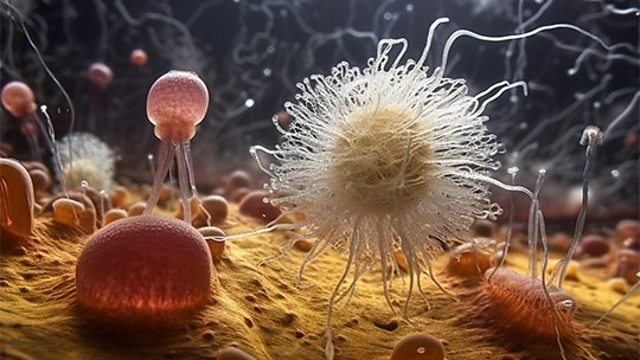The beginnings of us
The billion year old roots of modern life, the 462 million year old explosion of new species, and a critical look at the 350,000-year-old evidence of burial practices.
The origin of all complex life has been traced back 1.6 billion years as new molecular fossil records have discovered the fatty stains that our ancient single celled ancestors have left behind. Jochen Brocks, Professor of Geobiology at Australian National University, discusses the significance of these unique biological signatures.
One billion years later, to a mere 462 million years ago, life on Earth was experiencing a boom of new species but we have very few fossil records to understand this era. Now, palaeontologists Dr Joe Botting and Dr Lucy Muir have found the most abundant deposit of soft bodied fossils from this time in a tiny Welsh quarry.
Next, to the relatively recent past, 350,000 years ago, where remains found in a South African cave suggest that an extinct species of human, Homo Naledi, buried their dead. But Mike Petraglia, Professor of Human Evolution and Prehistory at the Max Planck Institute, doubts these claims.
And in the modern day, the fungi which have colonised our soil for millions of years are still helping us clean up the atmosphere. Professor of Plant-Soil Processes at the University of Sheffield, Katie Field, tells us about the astounding amount of carbon captured by the fungus beneath our feet.
Presenter: Roland Pease
Producer: Ella Hubber
(Image: Artistβs imagination of an assemblage of primordial eukaryotic organisms of the βProtosterol Biotaβ inhabiting a bacterial mat on the ocean floor.
Credit: Orchestrated in MidJourney by TA 2023)
Last on
More episodes
Previous
Next
Broadcasts
- Thu 8 Jun 2023 19:32GMTΒιΆΉΤΌΕΔ World Service except East and Southern Africa & West and Central Africa & ΒιΆΉΤΌΕΔ Afghan Radio
- Fri 9 Jun 2023 04:32GMTΒιΆΉΤΌΕΔ World Service Australasia, Americas and the Caribbean, South Asia & East Asia only
- Fri 9 Jun 2023 08:32GMTΒιΆΉΤΌΕΔ World Service
- Fri 9 Jun 2023 12:32GMTΒιΆΉΤΌΕΔ World Service
- Fri 9 Jun 2023 19:32GMTΒιΆΉΤΌΕΔ World Service East and Southern Africa & West and Central Africa only
- Sat 10 Jun 2023 16:32GMTΒιΆΉΤΌΕΔ World Service News Internet
Podcast
-
![]()
Science In Action
The ΒιΆΉΤΌΕΔ brings you all the week's science news.


